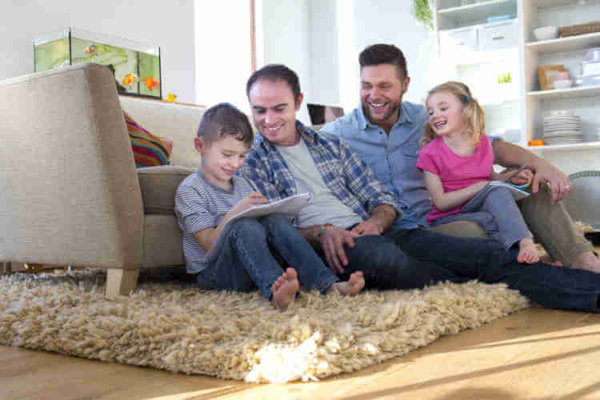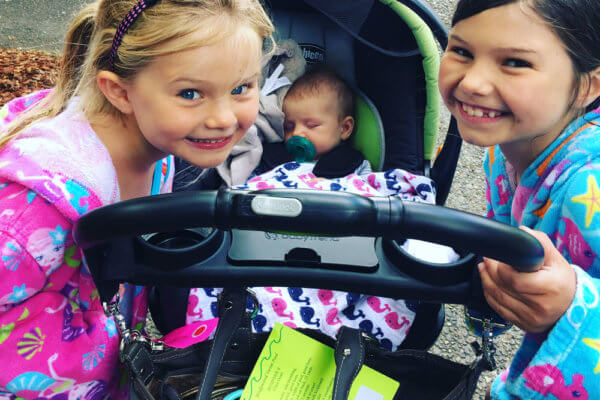Siblings: Get them in the ring
The most popular night of my seven-week Positive Discipline parenting series is the night we finally get to talk about siblings. From the first week, this is a source of angst for parents. It is on every list of challenges that we make, and usually the sibling fighting is a trigger that brings out the “Final straw! I’ve had it, that’s it!” moment in the night where we turn into the version of our parents we swore we would never become. It takes a full six weeks of building on parenting tools before we can get to this meaty and layered challenge.
In this class, I always start by asking that same question, “what did you learn from your siblings?” After some scoffing, the answers range from:
How to compromise.
How to solve problems.
How to share.
TO
How to fight.
How to defend.
How to get someone else in trouble.
How to not get caught by my parents.
What slowly gets drawn out in the discussion is that all siblings have conflict. Constantly. THIS is what triggers us as parents. It brings up our own issues with conflict and our own experience with siblings. Maybe it brings up that we never really learned how to do anything but avoid it. So when we see our children in conflict we freak out. We immediately worry they will hate each other forever, and we just want it to STOP.
Here lies the problem and the solution.
Conflict is NEEDED. Conflict TEACHES.
When we take away conflict our children lose the opportunity to practice solving problems, communicating, and being assertive. We bundle the wrestling and fighting and drawing blood (not ok) in the same boat as arguing over a toy. We separate, choose sides, and reinforce rivalry and roles (victim, bully, smart, aggressive, shy).
Siblings need the chance to be a team, and teams cannot be “nice” to each other all the time. They need to challenge each other, ask questions, and hold each other accountable. They need to build trust with each other, confide, and play. When we as parents control, pad and force only positive interactions, those natural and deep lasting bonds are not given opportunities to form.
With our children under the age of 5, this means teaching the first lessons in conflict resolution; supervising and coaching without taking sides. It’s teaching:
- What is the problem? Do they even have the same problem? It might just be helping them to clarify what it is they are fighting about.
- What are they feeling, and what do they want? Positive Discipline’s “,,bug and a wish” is magical for this. You can teach the precursor to an assertive I statement by handing them a plastic bug and a wand and guiding them to tell their brother “it bugs me when….and I wish you would…..”
- What did they hear? Then, coaching the brother on what they just heard: “It bugs you when… and you wish….” Teaching active listening skills might mean having the bug and wish repeated.
- ,What can they take responsibility for? This is a helpful stepping stone to ,,meaningful apologies. Without being forced, they can objectively take responsibility for their part of the problem.
- What can they do next time? This is where they have a re-do, a “try again” in a role play that empowers practicing a new skill as opposed to shame. They physical practice is key!
This can take a few rounds—both are likely to have a lot to say. Then you can coach the brainstorming with, “what is a solution you can both live with? (we call it a win-win)” Or, “I can hold onto the toy until you find a solution that works for you.”
When the conflict is too heated or escalated (or has gotten physical) then the teaching becomes about how we only solve problems when we are calmed down. Coach them through regulating the emotions without sweeping it under the rug.
Other skills to teach siblings include: how to make an apology; how to find things to do while you wait for your turn; and how to come up with different ways to decide who goes first (rock- paper- scissors, putting dukes in, flipping a coin). Many kids need practice in how to be a good sport. At the end of every game we play, we shake hands, look the person in the eye, and say “good game.”
When kids have practice – LOTS of practice—you see other skills emerge: negotiation, brainstorming, clearer communication, logic. These skills find their way into other opportunities for teamwork.
For example, last week the Girl Scout cookies took me down. We had 3 stores in our list of errands – and yes, all three had adorable 9-year-olds manning a table at the doorway. By the third store, I caved. I told my kids they could share a box (they bought it with their allowance), but they had to decide together. Halfway through their negotiating the mom of the Girl Scout said “you can’t be sisters, are you?” They nodded smiling, and I thought it was because yes, one has dark hair and eyes while the other is blond and blue-eyed. But she went on to say that she had never heard siblings like that before. I realized it was their methodical back and forth, going through first choice all the way to 4th until finding a match, listening but still holding firm to their wants. That was the rarity. In a flash, I thought about their screaming matches, the stomping, the tears, and all the PRACTICE.
Practice leads to skills, and skills lead to confidence and execution.
On my list of what I learned from my siblings? Loyalty, forgiveness, how to take care of each other, and how to laugh. I am so curious what my girls will have on their list when they look back at their relationships, and I hope their list is a long one.
Practice staying out of sibling fights for as long as you can (supervising for safety and before there is physical aggression), or try coaching neutrally. Teach conflict resolution, including how to ask for what you want, how to listen, and how to come to respectful solutions. If your children are preverbal or still building vocabulary, give them the words and phrases to use. Positive Discipline’s Wheel of Choice is another great tool to introduce here, making sure to teach into each of the choices on the wheel.
Looking for private coaching? We offer coaching for parents and caregivers all over the world. Check it out here.
Want help in creating your child’s calm down corner? Consider Generation Mindful’s Time-In Toolkit
This ToolKit is a step-by-step approach that supports YOUR mindset towards teaching and modeling healthy social emotional skills for and with kids, using preventative and responsive (strengths-based) practices instead of punitive or reactionary methods. GENM tools make the learning tangible, fun, and child-led- this is so important to cultivate intrinsic motivation: kids learn through relationship, autonomy, AND fun. When kids want to use their Time-In space all on their own, they are building that intrinsic motivation and skills that will last them a lifetime.
*Buy your Time-in Toolkit here.
*AS AN AFFILIATE, WE MAY RECEIVE COMPENSATION FROM GENERATION MINDFUL IF YOU PURCHASE PRODUCTS THROUGH THE LINK ABOVE. We only partner with people and companies that align with our mission and we wholeheartedly endorse Generation Mindful- tried, vetted and tested with our own kids!





Comments